Going the Distance
 There are many critics who like to feign anger or moral outrage towards a movie. That’s purely an emotional reaction and not an intellectual one; the truth is that very few films are worthy of any sort of ire, it’s just a terrific way to get attention by piling on the derogatory snark. Exceptions do occur, especially when our particular profession is used or detailed incorrectly. Roger Ebert and Richard Roeper complained about the way that TV news journalists were presented in Life or Something Like It and Money Talks (though the latter was during the Siskel era). They’re not wrong, from the standpoint of reality, which both films somewhat purport to represent, the inaccuracy is sort of staggering, especially Charlie Sheen’s reporter in Money Talks, who is so incompetent and unprepared, constantly editorializing on the fly, that he never would have been hired in the first place. But both films, a romantic comedy and an action comedy, respectively, are pretty innocuous, and their forgettable mediocrity transcends any obvious details they got wrong.*
There are many critics who like to feign anger or moral outrage towards a movie. That’s purely an emotional reaction and not an intellectual one; the truth is that very few films are worthy of any sort of ire, it’s just a terrific way to get attention by piling on the derogatory snark. Exceptions do occur, especially when our particular profession is used or detailed incorrectly. Roger Ebert and Richard Roeper complained about the way that TV news journalists were presented in Life or Something Like It and Money Talks (though the latter was during the Siskel era). They’re not wrong, from the standpoint of reality, which both films somewhat purport to represent, the inaccuracy is sort of staggering, especially Charlie Sheen’s reporter in Money Talks, who is so incompetent and unprepared, constantly editorializing on the fly, that he never would have been hired in the first place. But both films, a romantic comedy and an action comedy, respectively, are pretty innocuous, and their forgettable mediocrity transcends any obvious details they got wrong.*
Then why did Nanette Burstein’s Going the Distance infuriate me so much?
 It’s an innocuous romantic comedy starring Drew Barrymore and Justin Long trying to sustain a long distance relationship. Their characters don’t have much personality, the cast made up of comedians and reliable lowbrow comedy veterans like Christina Applegate, Jim Gaffigan, Jason Sudekis, Rob Riggle, Ron Livingston, etc., and the jokes are a mix of bumping-into-things slapstick and dirty versions of sitcom lines. Justin Long’s friends Charlie Day and Jason Sudekis have no lives of their own, they live vicariously through Long’s relationships, never discussing anything else.** Their scenes are just padding between those featuring Barrymore and Long getting to know each other through their mutual love of the classic arcade game Centipede and copious musical montages (the only bit of dialogue that isn‘t meant ironically? “Boy, the time went by so fast”). Of course montages in a romantic comedy are both an easy way to show the passing of time and more importantly, avoiding writing clever dialogue.
It’s an innocuous romantic comedy starring Drew Barrymore and Justin Long trying to sustain a long distance relationship. Their characters don’t have much personality, the cast made up of comedians and reliable lowbrow comedy veterans like Christina Applegate, Jim Gaffigan, Jason Sudekis, Rob Riggle, Ron Livingston, etc., and the jokes are a mix of bumping-into-things slapstick and dirty versions of sitcom lines. Justin Long’s friends Charlie Day and Jason Sudekis have no lives of their own, they live vicariously through Long’s relationships, never discussing anything else.** Their scenes are just padding between those featuring Barrymore and Long getting to know each other through their mutual love of the classic arcade game Centipede and copious musical montages (the only bit of dialogue that isn‘t meant ironically? “Boy, the time went by so fast”). Of course montages in a romantic comedy are both an easy way to show the passing of time and more importantly, avoiding writing clever dialogue.
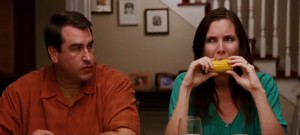 And to suggest that Long and Barrymore’s characters would say anything remotely clever is wishful thinking, their entire relationship is based on contrivances (and the fact that the opening scene has Long being dumped by his girlfriend because he didn’t know that when she said she didn’t want a birthday present, she didn’t really mean it, wasn’t this an old joke in the 1960s?). He’s a flunkie for a record company and she’s a too-old-and-aware-of-it intern for a NYC tabloid paper. She has only six weeks with Long before she has to return to San Francisco and her graduate degree.
And to suggest that Long and Barrymore’s characters would say anything remotely clever is wishful thinking, their entire relationship is based on contrivances (and the fact that the opening scene has Long being dumped by his girlfriend because he didn’t know that when she said she didn’t want a birthday present, she didn’t really mean it, wasn’t this an old joke in the 1960s?). He’s a flunkie for a record company and she’s a too-old-and-aware-of-it intern for a NYC tabloid paper. She has only six weeks with Long before she has to return to San Francisco and her graduate degree.
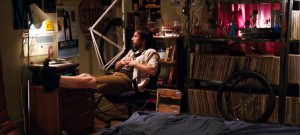 We think that the collapse of the newspaper and record industries will be a backdrop, but in fact it turns out to be the entire false crisis with which this relationship is threatened. Barrymore wants badly to write for a NY paper and Long loves NY and wants to stay, even if he hates his job. Why it matters what major city she writes in is never dealt with, unless it’s the idea of a NY aura, and he certainly can do his job in San Francisco or LA or since he’s so unhappy, he can switch careers. Of course, if he did, not only would there be no movie, there’d be no excuse for the hipster musical posters that litter his bedroom. Bedroom is a bit of a stretch he’s so financially strapped he has to live in the living room of a one bedroom apartment with Charlie Day, with walls so thin they can hear each other thinking.
We think that the collapse of the newspaper and record industries will be a backdrop, but in fact it turns out to be the entire false crisis with which this relationship is threatened. Barrymore wants badly to write for a NY paper and Long loves NY and wants to stay, even if he hates his job. Why it matters what major city she writes in is never dealt with, unless it’s the idea of a NY aura, and he certainly can do his job in San Francisco or LA or since he’s so unhappy, he can switch careers. Of course, if he did, not only would there be no movie, there’d be no excuse for the hipster musical posters that litter his bedroom. Bedroom is a bit of a stretch he’s so financially strapped he has to live in the living room of a one bedroom apartment with Charlie Day, with walls so thin they can hear each other thinking.
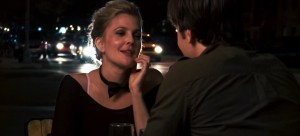
This scene is one of the strangest visually. It looks like "stolen" footage, at the same time as looking like poor green screen matting.
Despite the optimum living arrangements, Long’s not willing to wait tables like Barrymore is, so she’s offered the obvious option of giving up her dream so he can baby-sit the boy bands he loathes. But the fact is, even with the constant exterior landmark stock footage of NYC, nothing in the movie itself is tied to NY. The film is entirely studio-set bound or street footage shot so tightly that we can’t see what’s surrounding the characters. In other words, if Going the Distance had been shot in Canada, you wouldn’t notice anything different (it probably was). Of course, if the characters were to acknowledge their Canadian homes, again, there’d be no movie. Can you imagine this life-altering argument?
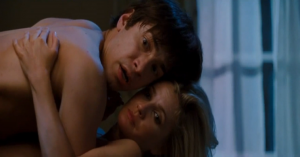 Barrymore: “I really want to be a reporter, especially in Toronto. But I have job opportunities in Vancouver, in the same, financially doomed industry.”
Barrymore: “I really want to be a reporter, especially in Toronto. But I have job opportunities in Vancouver, in the same, financially doomed industry.”
Long: “You should come live in Toronto, even if there is no work here. And besides, I have my low-paying job and my tiny apartment that I pay too much rent for, not to mention my intrusive roommate. They do not have such things in Vancouver.”
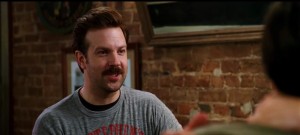 And yes, I’m aware that I haven’t addressed why Going the Distance made me as angry as any movie I’ve seen since Napoleon Dynamite. But in a way, with the above issues, I have, because a movie is made up of details, and this movie gets all the details distractingly wrong, to the point where things you should let go, become eyesores. For instance:
And yes, I’m aware that I haven’t addressed why Going the Distance made me as angry as any movie I’ve seen since Napoleon Dynamite. But in a way, with the above issues, I have, because a movie is made up of details, and this movie gets all the details distractingly wrong, to the point where things you should let go, become eyesores. For instance:
- While living in NY, Barrymore is very poor, so she buys a hot dog from a vendor. When Long calls her and invites her to dinner (for their second date), she immediately throws out the hot dog that she’s already paid for.
- Barrymore is said to be 31 years old, but since this movie is shot in splotchy-vision, where everything is various shades of gold, purple, and brown and all the actors look tired, have raccoon makeup***, and a weird combination of flushed and pale faces, her age is not the least bit believable.
- Sudekis and Day drag along Long to a 30th high school reunion, on the theory that Sudekis’ porno mustache will help him land the woman in her late 40s-early 50s who he desires for his sex-bucket list. The reunion, for some reason taking place at a bar open to the public (there are at least 40 people from the reunion there), and one of the women who hits on Sudekis tells him that he doesn’t look old enough to have been in her high school class. Day, who has added a Hitler mustache and outfit as his way of appealing to older folks (he claims it’s a Chaplin approximation), notices that people aren’t appreciating his appearance; especially the Jews in the corner. Then Burstein cuts to the corner of the bar, and it’s two ancient rabbis in full orthodox regalia. Of course they’d be offended, but why are they there in the first place?
- Barrymore and Long have phone sex, but these techno-junkies are using landlines instead of their cell phones, and the phones are proving annoying because they have to hold them. Wouldn’t these supposedly with-it people be using a hands-free technology like Bluetooth?
Every joke in Going the Distance is like that, negating itself before it’s even finished being told.
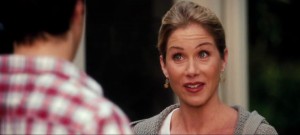 Barrymore is drunkenly ejected from a bar, and one of her insults towards the bruiser who took offense to her comments is that he’s probably “a Michael Bay fan.” Perfectly acceptable, except that it’s previously been established how much Long loves Top Gun, which was produced by Simpson/Bruckheimer, who also produced all the early Michael Bay films, and are certainly responsible for developing his style. Top Gun is an obvious immediate predecessor to and influence on The Rock, Bad Boys, and Armageddon.
Barrymore is drunkenly ejected from a bar, and one of her insults towards the bruiser who took offense to her comments is that he’s probably “a Michael Bay fan.” Perfectly acceptable, except that it’s previously been established how much Long loves Top Gun, which was produced by Simpson/Bruckheimer, who also produced all the early Michael Bay films, and are certainly responsible for developing his style. Top Gun is an obvious immediate predecessor to and influence on The Rock, Bad Boys, and Armageddon.
 Even the disposable small things are off; Barrymore repeatedly enters Long’s apartment without his knowledge. One time, she just opens the door (no one in New York leaves their apartment door unlocked). Another time she has a key. Do a lot of people who you’ve never lived with and have a very-long distance relationship with for a few months have a key to your apartment? Barrymore lives with Applegate (her sister, who for some reason is married to the oblivious Gaffigan, who is portrayed as not-too-bright) in San Francisco. In one scene, Barrymore and Long come back to the house very drunk (who drove?****) and late at night, begin to make out. The electronic house alarm is the only other thing visible in the shot (this happens at two different times in the film). And Barrymore pays no attention to it and it never seems to go off or alert authorities.
Even the disposable small things are off; Barrymore repeatedly enters Long’s apartment without his knowledge. One time, she just opens the door (no one in New York leaves their apartment door unlocked). Another time she has a key. Do a lot of people who you’ve never lived with and have a very-long distance relationship with for a few months have a key to your apartment? Barrymore lives with Applegate (her sister, who for some reason is married to the oblivious Gaffigan, who is portrayed as not-too-bright) in San Francisco. In one scene, Barrymore and Long come back to the house very drunk (who drove?****) and late at night, begin to make out. The electronic house alarm is the only other thing visible in the shot (this happens at two different times in the film). And Barrymore pays no attention to it and it never seems to go off or alert authorities.
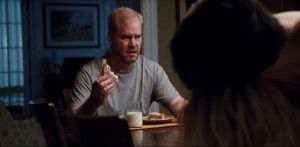 The worst moments have Barrymore debating whether or not to take a job offer she has at the San Francisco Chronicle (the only real paper named; perhaps they want to seem like they’re always hiring?). If this movie were made in 1997*****, which is what it often feels like (especially the phone sex scene), perhaps that would make sense. But in 2010, it just feels lazy and an insult to our intelligence. In reality today, she’d be thrilled to take the job, let alone if offered a living wage. And Long, if he weren’t an idiot, would be just as happy.
The worst moments have Barrymore debating whether or not to take a job offer she has at the San Francisco Chronicle (the only real paper named; perhaps they want to seem like they’re always hiring?). If this movie were made in 1997*****, which is what it often feels like (especially the phone sex scene), perhaps that would make sense. But in 2010, it just feels lazy and an insult to our intelligence. In reality today, she’d be thrilled to take the job, let alone if offered a living wage. And Long, if he weren’t an idiot, would be just as happy.
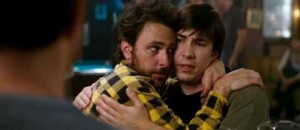 Print journalism is deemed dying, but Barrymore’s boss at the NY tabloid has time to hold the hands of her and three other interns, correcting and marking up their articles that he never has any intention of running. And then he tells her if she wants to write, perhaps she should take up blogging as a journalist, as if it’s meant to be a demeaning and derisive comment******? Isn’t blogging the easiest way, at this point, to get your writing and message out to the public?
Print journalism is deemed dying, but Barrymore’s boss at the NY tabloid has time to hold the hands of her and three other interns, correcting and marking up their articles that he never has any intention of running. And then he tells her if she wants to write, perhaps she should take up blogging as a journalist, as if it’s meant to be a demeaning and derisive comment******? Isn’t blogging the easiest way, at this point, to get your writing and message out to the public?
 Long complains that his record label will never sign this cool indie band that he loves. But if the movie were made now, the record label wouldn’t even be part of the issue. The band would be on MySpace and YouTube putting up music and videos, getting Facebook fan pages, and selling their MP3s through their website, without having to worry about what a record company thinks.
Long complains that his record label will never sign this cool indie band that he loves. But if the movie were made now, the record label wouldn’t even be part of the issue. The band would be on MySpace and YouTube putting up music and videos, getting Facebook fan pages, and selling their MP3s through their website, without having to worry about what a record company thinks.
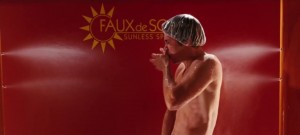 In a way, Going the Distance is a lot like Harold Ramis’ Year One, which was another ineffectual disaster of a comedy featuring usually funny comedians in a myriad of roles but destroyed by a script that felt like it was written 40 years ago. Year One was punched up with poop and masturbation jokes. In Going the Distance, one of the few concessions to contemporary culture is a sequence where Long tries to get an artificial tan and the machine squirts him in the eyes (he deliberately eschews the goggles, because, it would be funnier if he got spray tanner in the eye?). He flails around, of course missing the more sensitive areas, resulting in a handprint on his butt (a print that would be physically impossible if he did it to himself, unless as part of his brain removal he also got rid of his ribs and backbones), that’s revealed at the most inopportune moment. All of Going the Distance is like that, charging you money for a sloppily applied spray tanner that squirts you in the eye.
In a way, Going the Distance is a lot like Harold Ramis’ Year One, which was another ineffectual disaster of a comedy featuring usually funny comedians in a myriad of roles but destroyed by a script that felt like it was written 40 years ago. Year One was punched up with poop and masturbation jokes. In Going the Distance, one of the few concessions to contemporary culture is a sequence where Long tries to get an artificial tan and the machine squirts him in the eyes (he deliberately eschews the goggles, because, it would be funnier if he got spray tanner in the eye?). He flails around, of course missing the more sensitive areas, resulting in a handprint on his butt (a print that would be physically impossible if he did it to himself, unless as part of his brain removal he also got rid of his ribs and backbones), that’s revealed at the most inopportune moment. All of Going the Distance is like that, charging you money for a sloppily applied spray tanner that squirts you in the eye.
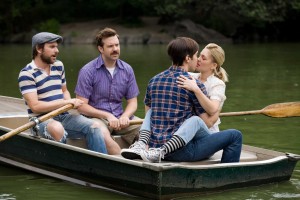 * Considering it is likely that most of the cast and crew had worked in television at some point, it’s pretty embarrassing that no one would mention any logical flaws.
* Considering it is likely that most of the cast and crew had worked in television at some point, it’s pretty embarrassing that no one would mention any logical flaws.
** Any heterosexual male with a group of friends could tell you that guys rarely, if ever, go into even the most superficial details about their burgeoning and/or ongoing relationships.
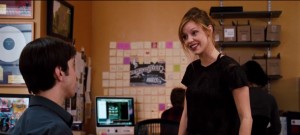 *** Minor characters, such as Kristin Schaal and Kelli Garner, who normally have their own interesting and attractive look, are debased with the sloppily applied eye makeup.
*** Minor characters, such as Kristin Schaal and Kelli Garner, who normally have their own interesting and attractive look, are debased with the sloppily applied eye makeup.
**** There’s a strange thing with driving in this movie. Long can’t afford his own apartment, but for some reason owns a car. [But he can afford occasional flights to California to visit Barrymore] First, he wouldn’t be able to afford car insurance in NYC — let alone parking. And second, why wouldn’t he be all over public transportation, which even the billionaire mayor partakes in? The public transportation system in NYC is one of the best in the world; affordable, convenient and certainly faster than driving (especially to the airport, a common scene in this film). Then again, these characters are deliberately stupid.
 ***** Despite IMDB claiming that the movie was shot last summer, the whole thing has a moldy late ’90s Miramax feel (like Jordan Brady’s The Third Wheel). In fact, it’s one of the last films produced by New Line before it was swallowed up and dismantled by Warner Brothers. Perhaps this was a contractually obligated release mandated by Barrymore’s contract, much like last year’s The Marc Pease Experience with Ben Stiller?
***** Despite IMDB claiming that the movie was shot last summer, the whole thing has a moldy late ’90s Miramax feel (like Jordan Brady’s The Third Wheel). In fact, it’s one of the last films produced by New Line before it was swallowed up and dismantled by Warner Brothers. Perhaps this was a contractually obligated release mandated by Barrymore’s contract, much like last year’s The Marc Pease Experience with Ben Stiller?
****** This is not a defense mechanism kicking in for me; while my writing appears on the internet, it also appears in three print newspapers.




FEM beefs: Those who can’t do, hate… - says:
September 13th, 2010
9:06 pm
[…] who is apparently the editor of this blog called A Regrettable Moment of Sincerity. I just saw his review of “Going The Distance” and listened to his long-ass podcast with the screenwriter @geofflatulippe and was so annoyed by it […]